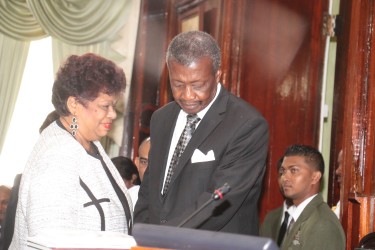Former senior diplomat of the Ministry of Foreign Affairs, Dr Barton Scotland SC, was yesterday elected to preside over the 11th Parliament of the country.
Scotland, who was the only nominee of the coalition government, took his oath in the absence of the PPP/C’s 32 members as the party, which has been strongly protesting the results of the May 11 polls, is yet to indicate whether it will take up those seats and has not nominated its members.
The new Speaker, who has a long diplomatic and legal career and has also lectured, was nominated by Minister of Cohesion Amna Ally, who is also Chief Whip of the government. The nomination was seconded by Minister of Tourism Catherine Hughes, symbolizing agreement in the coalition on this candidature.

“Are there any further nominations?” Clerk Sherlock Isaacs asked, and receiving no answer he announced that Dr Scotland was nominated and duly elected as Speaker. This announcement was greeted by applause from those present including Dr Scotland’s wife.
After reading the oath slowly, with emphasis on each word, the new Speaker was escorted to his chair by Ally and Hughes and he right away got into the business of the House stating that while his first task was to preside over the election of the Deputy Speaker, he was advised that such a person is chosen from among the opposition members and given their absence that election would be deferred.
Announcing that Isaacs would be administering the oath to the members, he said that in the interest of time he would dispense with the practice of having the Clerk move from one member to another while this is being done. Instead, he proposed that the Clerk name the member and as his/her name is called the member would stand and repeat the oath, after which that member would sit and sign the oath, while the name of the next member is called. Thus, all 36 members (three of them are technocrat members without voting rights) were sworn.
In very brief remarks, Scotland told the members that by electing him as Speaker they presented him with an opportunity to join with them in fulfilling the legislative programme.
“I invite you to let us work together to that end and may our efforts be crowned with success,” he said.
Congratulating Scot-land, Prime Minister Moses Nagamootoo said he had followed his career for many years. He noted that their paths had crossed before while Dr Scotland was a lecturer at the University of Guyana and he was a student. Now, they have arrived at a juncture where Scotland is Speaker and he is the Leader for Government Business in the National Assembly.
“I am very confident, as Leader of the House that we will rely on your guidance, on your great sense of impartiality and your scholarship [to] take this House through what at times could be very troubled waters,” the Prime Minister said adding that the members are there to assist the Speaker in whatever way they could.
Dr Scotland’s name would have been decided by the coalition government on Tuesday as there were two others—attorneys Roysdale Forde and Stephen Fraser—who were also considered as prospective candidates. According to the Cummingsburg Accord, there had to have been consensus among the parties on the person to hold the post, who would have come from civil society.
Scotland held various diplomatic posts and once headed the Department of International Economic Co-operation under the late President Desmond Hoyte. He served as an advisor to the Ministry of Foreign Affairs in 2012 and was part of the team that accompanied then foreign minister Carolyn Rodrigues-Birkett in April of that year when she made an oral presentation in support of Guyana’s submission for an extended continental shelf to the Commission on the Limits of the Continental Shelf at the headquarters of the United Nations in New York. Scotland is also an acknowledged expert on the Law of the Sea.
He also served as a Commissioner on the Caricom Competition Commission which was launched in 2008 and later became its Chairman. Scotland worked in private practice in the areas of Natural Resources and Investment Law, Negotiations and International Law. He holds a Master of Laws degree and a PhD in International Law.





